c. 1014 Avicenna becomes the court physician in Tehran and writes The Canon of Medicine and The Book of Healing
1054
 Great Schism of Greek from Roman Church
Great Schism of Greek from Roman Church
1066
 William I the Conqueror defeats Harold at Hastings to become 1st Norman King of
England.
William I the Conqueror defeats Harold at Hastings to become 1st Norman King of
England.• French philosopher and theologian Roscellin promotes Nominalism
1095 Al-Ghazali resigned his prestegious teaching position in Baghdad and continued his scholarship in accordance with Sufi mysticism.
1095 Pope Urban II calls for a Crusade at the Council of Clermont.
• Archbishop of Canterbury Anselm challengess English kings William II and Henry I in the Investiture Controversy and is exiled twice.
1116  Abelard courts and later marries his precocious student Heloise
Abelard courts and later marries his precocious student Heloise
c. 1119 Saint Bernard co-founds the Knights Templar
• Islamic philosopher Avempace from Northeastern Spain writes one of the first commentaries on Aristotle
1121 Abelard's non-trinitarian philosophy condemned as heresy at Soissons
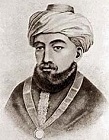
1138-1204  Maimonides, expelled from Muslim Spain, will become head of Jewish community in Egypt
Maimonides, expelled from Muslim Spain, will become head of Jewish community in Egypt
1148-51 Peter Lombard, a bishop of Paris, writes Four Books of Sentences, which becomes the standard theological text of the Middle Ages
1160 David Alroy, false messiah
c. 1160 Arab polymath Ibn Tufayl writes the first philosophical novel, Hayy ibn Yaqdhan (The Living Son of the Vigilant),
1169-1170s Andalusian (Spanish Muslim) polymath Averroes writes commentaries on Aristotle, which are later read by Europeans.
1170  Thomas Becket murdered by English K. Henry II's knights after asserting the rights and privileges of the Church
Thomas Becket murdered by English K. Henry II's knights after asserting the rights and privileges of the Church
1187 Saladin takes Jerusalem
1189-92 3rd Crusade
1190  Rise of the Kabbalah Jewish mysticism
Rise of the Kabbalah Jewish mysticism
1202-04 Fourth Crusade, Constantinople captured, Latin Empire established - 1261
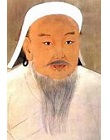
1206-1227  Ghengis Khan rules Mongolia
Ghengis Khan rules Mongolia
1209 The exhumed body of Amalric of Bena was burnt along with ten of his Amalrician followers in Paris for heresy.
1208  Francis of Assisi founds Friars Minor
Francis of Assisi founds Friars Minor
1208-29  Albigensian Crusade against French heretics had a role in the creation and institutionalization of both the Dominican Order and the Medieval Inquisition.
Albigensian Crusade against French heretics had a role in the creation and institutionalization of both the Dominican Order and the Medieval Inquisition.
1212 Children's Crusade
1228-29 5th Crusade led by Frederick II
crowned King of Jerusalem, signs treaty with infidels
1234 Books of Maimonides condemned and burned in Provence by anti-Maimonidean rabbis and the Dominican-led Inquisition because of their association with Catharism.
1242 Burning of Talmud at Paris
1245 German Albertus Magnus teaches theology to Thomas Aquinas at the University of Paris.
1244 Moslems take Jerusalem
1248 Louis IX leads 6th Crusade
captured by Saracens 1250, released 1254
1270 7th Crusade Louis IX dies of plague in Tunis
1274 Cardinal Bonaventure helps unite the Greek and Latin churches at Second Council of Lyon
1265-1274 Thomas Aquinas writes Summa Theologica ('Summary of Theology')
1294 Lanfranchi founds French surgery
1300s Scottish priest Duns Scotus lectures at the University of Paris after developing popular doctrines about God and existence. Critics coin the term Dunce Cap for his students.
1309-77 Babylonian Captivity of Pope in Avignon
1324 German Dominican Meister Eckhart accused of heresy because of his work with pious lay groups who were questioning the inquisition.
1324 William of Ockham's commentary on Peter Lombard's Four Books of Sentences was condemned as unorthodox and officially excommunicated in 1328 because of disagreements with Pope John XXII at Avignon.
1378-1417 Great Schism-2 Popes
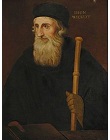
1380  John Wycliffe translates the Bible into English
John Wycliffe translates the Bible into English
1381 Wycliffe is dismissed from the University of Oxford for criticism of the Catholic Church, leading to the Lollardy movement
1415 Jan Hus is betrayed by future Emperor Sigismund and excommunicated by the Archbishop of Prague and burned at the stake.
1428 English begin Siege of Orléans.
1429  Joan of Arc leads the French to break the siege of Orléans.
Joan of Arc leads the French to break the siege of Orléans.
1431 Jeanne D'Arc is burned alive at Rouen, France.
1440  Johannes Gutenberg develops his Printing Press
Johannes Gutenberg develops his Printing Press
1441 German-Dutch Thomas à Kempis writes The Imitation of Christ
1449 Nicholas of Cusa was made a cardinal by Pope Nicholas V. In 1450 he was both named Bishop of Brixen, in Tyrol, and commissioned as a papal legate to the German lands to spread the message of reform.
1453  Turkish leader Mehmed II besieges and captures Constantinople, making
Turkish leader Mehmed II besieges and captures Constantinople, making
the Ottoman Empire a major regional power and
ending European trade with Asia.
•  The Hagia Sophia church is convertd into a mosque
The Hagia Sophia church is convertd into a mosque
1475 The Arquebus (hook gun) first appears in Europe and the Ottoman Empire.
1481 Spanish Inquisition begins
1488  Bartholomew Diaz rounds Cape of Good Hope finding a route to Asia
Bartholomew Diaz rounds Cape of Good Hope finding a route to Asia
1492 Spanish capture Granada from Muslims.
1492 Jews expelled from Spain, and Columbus sails to America
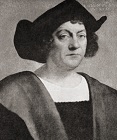
1492  Christopher Columbus, underestimating the earth's circumference, attempts to sail west from Spain to China, hoping to establish a trade route and spread Christianity, but instead "discovers" America, which he believes to be Indonesia.
Christopher Columbus, underestimating the earth's circumference, attempts to sail west from Spain to China, hoping to establish a trade route and spread Christianity, but instead "discovers" America, which he believes to be Indonesia.
1494 Treaty of Tordesillas, Pope Alexander VI divides the New World btw. Spain &
Portugal
1499  Vasco De Gama sails from Portugal to India.
Vasco De Gama sails from Portugal to India.
1500
 Portuguese Pedro Cabral discovers Brazil.
Portuguese Pedro Cabral discovers Brazil.1513 Vasco Núñez de Balboa crosses the Isthmus of Panama and discovers the Pacific Ocean
1516 Dutch scholar and humanist Erasmus translates the New Testament into Latin.
1517
 Martin Luther posts 95 Theses to the door of the castle church in Saxony.
Martin Luther posts 95 Theses to the door of the castle church in Saxony.1519 Spaniard Hernando Cortez tours Mexico City at the invitation of Aztec king Moctezuma II. 1519-22 Ferdinand Magellan leads first expedition to circumnavigate the earth
1521 Luther in refuge translates New Testament
1521
 Hernando Cortez conquers the Aztecs - Memoir of a Conquistador
Hernando Cortez conquers the Aztecs - Memoir of a Conquistador1524-5 The emerging Protestant Reformation and increasingly oppresive serfdom leads to the German Peasants' War
1527
 Spaniard Francisco Pizzaro begins invasion of Peru; causes smallpox epidemic among
native peoples.
Spaniard Francisco Pizzaro begins invasion of Peru; causes smallpox epidemic among
native peoples.1527 Paracelsus lectures on his innovative use of chemicals and minerals in medicines at the University of Basel.
1530s Muskets (muzzle-loaded long rifles) are used to penetrate heavy plate armor.
1532 Portuguese Jewish mystic and messiah claimant Solomon Molcho is burned alive at the stake by Holy Roman Emperor Charles V.
1534
 King Henry VIII recognized as head of the Church of England.
King Henry VIII recognized as head of the Church of England.1534 Ignatius of Loyola founds the Jesuit Order.
1534 Anabaptist "Communist State"
1535 Thomas More, Lord High Chancellor of England and author of Utopia , opposed the English Reformation and was tried and executed for treason.
1536 John Calvin writes 'Instructions'
1542 Álvar Núñez Cabeza de Vaca publishes "Shipwrecks and Commentaries" providing detailed accounts of the many tribes of Native Americans that he encountered.
1542
 Portuguese sailors make contact with Japan.
Portuguese sailors make contact with Japan.
1543 Nicolaus Copernicus publishes a book (On the Revolutions of the Celestial Spheres) outlining a sun-centered universe, just before his death.
1565 Italian philosopher Bernardino Telesio publishes his first edition of (On the Nature of Things according to their Own Principles), which stressed empirical data and helped develop the scientific method.
1572
 St. Bartholomew's Day Massacre: Royal army slaughters thousands of Protestants in Paris.
St. Bartholomew's Day Massacre: Royal army slaughters thousands of Protestants in Paris.1580 French philosopher Michel de Montaigne publishes his Essays, the literary genre he is known for popularizing.
1590s
 Most of Shakespeare's plays are written.
Most of Shakespeare's plays are written.1593 Italian philosopher Giordano Bruno is imprisoned for his cosmological theories that stars are distant suns with their own planets. He was eventually burned alive at the stake in 1600 for his associated theological beliefs.
1598
 French King Henry IV issues Edict of Nantes, giving rights to French
Protestants.
French King Henry IV issues Edict of Nantes, giving rights to French
Protestants.1599 Italian Dominican philosopher Tommaso Campanella, who conspired against the Spanish rulers of southern Italy, was tortured and sent to prison, where he spent 27 years writing his most significant works, including The City of the Sun, a utopia describing an egalitarian theocratic society where property is held in common.
1609
 Galileo Galilei discovers the moons of Jupiter with a homemade telescope
Galileo Galilei discovers the moons of Jupiter with a homemade telescopeCampanella was an Italian Dominican friar, philosopher, theologian, astrologer, and poet.
German philosopher, Christian mystic, and Lutheran Protestant theologian Jakob Böhme
1609-19
 Johannes Kepler's laws of planetary motion published.
Johannes Kepler's laws of planetary motion published.1611
 The King James Version of the Bible was completed
The King James Version of the Bible was completed1620 Lord Chancellor of England Francis Bacon publishes The Great Instauration and New Method, which advocated for empirical observation and a Scientific Method to understand physical reality.
1631 French philosopher Pierre Gassendi is the first person to observe the transit of a planet (Mercury) across the Sun.
1637
 René Descartes formulated analytic geometry
René Descartes formulated analytic geometry 1642
 Blaise Pascal invents the mechanical calculator
Blaise Pascal invents the mechanical calculator1651 English philosopher Thomas Hobbes publishes Leviathan, in which he argues for a social contract and rule by an absolute sovereign.
1660s writings by Flemish Cartesian philosopher Arnold Geulincx emphasized the powerlessness and ignorance of the human condition. Reasoning that there is nothing that "is my own but to know and to will", he concluded "if you do not know how a thing is done, then you do not do it".
1665 French moralist François de La Rochefoucauld publishes Maximes (basic truths about life), which established his position among the men of letters of the time.
1666 The ordained rabbi and messiah claimant Sabbatai Zevi (1626–1676) is imprisoned in Constantinople and given the choice of execution or conversion to Islam. He converted, but his Sabbatean movement continued on into the 19th century.

1668
 Isaac Newton makes the first reflecting telescope and publishes his Laws of Motion in 1687.
Isaac Newton makes the first reflecting telescope and publishes his Laws of Motion in 1687.1677
 Baruch Spinoza dies and his students preserve his writings, which are later published.
Baruch Spinoza dies and his students preserve his writings, which are later published.1689 English philosopher John Locke anonymously publishes Two Treatises of Government, which presents the consent of the governed as a means to protect the three natural rights of "life, liberty and estate". For decades it was rarely cited, but its influence would greatly increase in the 18th century.
1680s - 1700s French philosopher Nicolas Malebranche controversially combined concepts of Descartes and Aquinas in claiming that the ideas through which we perceive objects exist in God and all interaction between mind and body is mediated by God.
c. 1693-97 English poet and playwright John Dryden (1631-1700) translated many classic works, including The Lives of Plutarch, The Iliad, The Satires of Juvenal, and The Works of Virgil.
1710 Anglo-Irish philosopher George Berkeley published A Treatise Concerning the Principles of Human Knowledge, which claimed reality is constructed entirely of immaterial, conscious minds and their ideas, including the mind and ideas of God.
1714 Daniel Fahrenheit invents the mercury-in-glass thermometer
1726-28
 Voltaire in exile in Great Britain
Voltaire in exile in Great Britain1729 - Benjamin Franklin begins publishing The Pennsylvania Gazette.
1731 The first American public library is founded in Philadelphia by Benjamin Franklin.
c. 1730–1755
 The First Great Awakening starts in Great Britain
The First Great Awakening starts in Great Britain1740
 George Whitefield spreads the First Great Awakening to New England
George Whitefield spreads the First Great Awakening to New England1742
 Marvel's Mill, the first water-powered cotton mill in England.
Marvel's Mill, the first water-powered cotton mill in England.1742 Anders Celsius proposes the 1st version of his centigrade temperature scale.
1747 French physician and materialistic philosopher Julien Offray de La Mettrie publishes Man a Machine in which he concluded the human mind and soul were not separate from our physical bodies. His views were so controversial that he had to flee France and settle in Berlin.
1748 Montesquieu anonymously published The Spirit of Law, in which he analyzed and compared governments, and introduced concepts like the separation of powers that would influence many future constitutions.
1751 Scottish philosopher David Hume publishes Principles of Morals in which he claims morality is not the result of human reason. He is also known for arguing that belief in causality is derived from custom and mental habit.
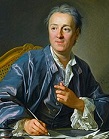
1752-72
 Denis Diderot is chief editor of the Encyclopédie published in France
Denis Diderot is chief editor of the Encyclopédie published in France1757
 Benjamin Franklin invents the lightning rod
Benjamin Franklin invents the lightning rodEmanuel Swedenborg was an accomplished scientist and inventor from Sweden who wrote 18 theological books after a "spiritual awakening" in 1744. His book on the afterlife, Heaven and Hell (1758) was the most popular, and his concept of the Divine Trinity within Jesus vs the Trinity of Persons was the most controversial.
1759 French philosopher Claude Adrien Helvétius was a student and leader of the Enlightenment. His original ideas are those of the natural equality of intelligences and the omnipotence of education.
1762 Swiss philosopher Jean-Jacques Rousseau publishes The Social Contract which outlines the evolution of society and how humans can regain their freedom through agreement on enlightened laws.
1746-80 French priest Condillac wrote about the philosophy of the mind, most famously on the origin of human knowledge and sensation. Condillac considered language as the vehicle by which senses and emotions were transformed into higher mental faculties.
1778 French chemist Antoine Lavoisier discovers the role of oxygen in combustion and names the element. He later discovered other elements and the law of conservation of mass. Lavoisier was beheaded in 1794 during the Reign of Terror.
1780 Franz Mesmer (1734-1815) treats patients with a process he calls mesmerism that will evolve into hypnosis.
1781 German Immanuel Kant, the "father of modern philosophy" publishes the 1st edition of the Critique of Pure Reason. Kant believed that reason is the source of morality, but that human experience is understood through intuition. The limits of human knowledge are why we need hope and faith to be free.
1787 The power loom was invented by English Edmund Wright, a key development in the early Industrial Revolution.
1790-1840 Second Great Awakening began in Kentucky and Tennessee among the Presbyterians, Methodists, and Baptists.
1799 Italian physicist Alessandro Volta invents the first electric battery. The volt, a unit of measurement regarding the strength of an electric current, was named in his honor in 1881
1800 French zoologist Jean-Baptiste Lamarck presents the first cohesive theory of biological evolution, consisting of two forces driving the increasing complexity of organsisms and their adaptation to their environments. "Lamarckism" refers to the inheritance of physical traits based on their use or disuse.
1807 German philosopher Georg Wilhelm Friedrich Hegel publishes The Phenomenology of Spirit, in which he first presented his dialectical method. The word "Geiste" can be translated as "Spirit" or "Mind", and Hegel wrote that it becomes knowledge in stages.
1808 English chemist John Dalton presents the first Atomic Theory with a method of calculating the relative atomic weights of elements. He based it on his study of gasses as a meteorologist.
1810s Maine de Biran was a French aristocrat who temporarily retired from politics during the French Revolution and developed three philosophical systems based on 1. sensation, 2. human will and 3. religion. After 1818, Biran advocated a mystical intuitional psychology.
1819 German philosopher Arthur Schopenhauer publishes The World as Will and Representation in which he, like Kant, views experience as a "representation" or "idea" of the world. Schopenhauer identifies the actual essence of things as "will". He says art can temporarily release us from the endless suffering caused by this blind force, but that true redemption only comes through asceticism.
1820 French physicist André-Marie Ampère develops a mathematical and physical theory for the relationship between electricity and magnetism. The unit for measuring a electric current, "ampere" or "amp", is named after him. He also invented the solenoid and the electrical telegraph.
1821 Michael Faraday was the first to demonstrate the conversion of electrical energy into motion and discovered electromagnetic induction 10 years later and made the first electric generator. He also discovered new chemical compounds, but his name is now most commonly associated with the "Faraday Cage".
1827 German physicist Georg Ohm published The Galvanic Circuit Investigated Mathematically containing his discovery that electromotive force is the product of the strength of the current, and the resistance of that part of the circuit, Ohm's Law.
1829 The first treated (sand-filtered) public water supply was installed by the Chelsea Waterworks Company in London.
1830 Joseph Smith writes "Book of Mormon" in March, in April founds the Church of Christ
1840s Spiritualism first appears in the "Burned-over District" of upstate New York
1843-1844 William Miller predicts the Second Coming of Jesus, resulting in the Great Disappointment of his followers.
1844 German Max Stirner publishes The Ego and Its Own which asserts that everyone is propelled by their own egoism and desires, and that people who accept this can live freely and those who do not will falsely believe they are serving another cause while unknowingly actually serving their egos. Stirner was a friend of Friedrich Engels and influenced several postmodern movements.
1844 Joseph Smith is killed in Missouri by disillusioned Mormons.
1847 Brigham Young leads Latter Day Saints to Utah
1848 French philosopher and mathematician Auguste Comte published A General View of Positivism in which he outlined 3 stages of social evolution, 1. theological. 2. metaphysical, and 3. scientific (positive). It is considered the founding text of sociology.
1848 German-born revolutionary Karl Marx cowrote The Communist Manifesto with Friedrich Engels and wrote the three-volume Das Kapital from 1867 - 1894. His philosophy of Marxism has exerted enormous influence on modern intellectual, economic and political history.
c. 1855–1930 Third Great Awakening
1856-63 Gregor Mendel's pea plant experiments established many of the principles of inheritance.
1857 French microbiologist Louis Pasteur's experiments showed that specific microorganisms were associated with fermentation of food. His Pasteurization process was achieved by killing them with oxygen or heat. This gave rise to germ theory and his vaccinations for rabies, cholera and anthrax.
1857 Allan Kardec published his first book on Spiritism, interpreting reincarnation from a Christian perspective.
1859 Charles Darwin pusblishes On the Origin of Species which proposed that natural selection was the driving force in biological evolution.
• Danish theologian, philosopher, poet, social critic Soren Kierkegaard was a Christian existentialist 1861 John Stuart Mill formulates his principle of basing decisions on whaterver results in the greatest happiness for the greatest number of people in his book Utilitarianism, based on the ethical philosophy of Jeremy Bentham. He was also one of the earliest advocates of women's suffrage.
1861 The Gatling_gun is invented by American John Gatling.
1863 Former Millerites conclude that Jesus entered into the most holy place of the heavenly sanctuary and found the Seventh-day Adventist Church
1869 Russian chemist Dmitri Mendeleev formulates the Periodic Law and constructs the first periodic table of elements.
1873 Scottish physicist James Clerk Maxwell publishes the textbook A Treatise on Electricity and Magnetism in which he presents his 20 equations and theory of electromagnetic radiation as well as the discoveries of his teacher Michael Faraday and other physicists.
1875-6 Mystic Madame Blavatsky co-founded the Theosophical Society with Olcott and William Quan Judge.
1876 Alexander Graham Bell patents the electrical telephone and co-founds AT&T in 1885.
1877 Thomas Edison invents the phonograph and the light bulb in 1879.
1879 Freemason Charles Taze Russell starts the Jehovah's Witnesses denomination with his monthly Watchtower magazine.
1879 Mary Baker Eddy founded The Church of Christ, Scientist.
• American scientist, mathematician, logician, and philosopher Charles S. Peirce was considered the most versatile intellect in the Americas.
• German philologist, philosopher, poet and composer Friedrich Nietzsche rejected the idea of objective reality and viewed perception and knowledge as dependent on our personal and changing perspectives.

1888
 Nikola Tesla licenses Alternating Current to Westinghouse Electric
Nikola Tesla licenses Alternating Current to Westinghouse Electric1896 Austrian neurologist Sigmund Freud begins using the term "psychoanalysis" to refer to his new clinical method and theories.
 The Gilded Age | AMERICAN EXPERIENCE | PBS
The Gilded Age | AMERICAN EXPERIENCE | PBS1900 The Brownie camera is invented and popularized by Eastman Kodak
1901 Ferdinand von Zeppelin builds the first successful dirigible.
1901 The first radio receiver was developed by Guglielmo Marconi.
1902 Air conditioner is invented by Willis Carrier
1903
 The Wright brothers of Ohio develop the first powered plane.
The Wright brothers of Ohio develop the first powered plane.1904 English occultist Aleister Crowley writes The Book of the Law to promote the religion of Thelema in which practioners pursue their "True Will".
1904-30 Columbia Univ. professor of philosophy John Dewey believed that education and learning are social and interactive processes. He was an early advocate of reforming society through public schools.
1906 Maria Montessori creates her first classroom and begins developing her method of education.
1907 Swiss philosopher Ferdinand de Saussure began teaching the Course of General Linguistics. The notes from his lectures after his death established the science of language.
1908 Mary Baker Eddy founded The Christian Science Monitor.
1912 Rudolf Steiner broke away from the Theosophical Society to found an independent group, which he named the Anthroposophical Society.
1914-1919 World War I
• British logician and mathematician Bertrand Russell was a popular public intellectual. His thesis in Principia Mathematica that mathematics and logic are one and the same had no practical significance for most people, but Russell wrote about current affairs with style and wit.
c. 1920s - 30s The logical positivism movement in Vienna and Berlin sought to formulate a scientific philosophy based on empirical science rather than metaphysics or theology. The focus shifted later to the philosophy of science.
1927 German philosopher Martin Heidegger publishes Being and Time, which explored subjective conscious experience and advanced Phenomenology.
•
 America Through The Decades: 1930s-1950s
America Through The Decades: 1930s-1950s1935 American libertarian author and editor Albert Jay Nock publishes Our Enemy, the State, which influences a wide range of conservative and libertarian thinkers.
1937 German philosopher and sociologist Max Horkheimer's essay "Traditional and Critical Theory" analyzed and challenged systemic power relations in society, arguing that knowledge, truth, and social structures are fundamentally shaped by power dynamics between dominant and oppressed groups.
1941 Menachem Mendel Schneerson 1902-1994) arrives in New York and soon takes on leadership positions in the Chabad-Lubavitch movement, eventually becoming its 7th Rebbe. He never visited Israel, but he influenced development there and many of Israel's leaders visited him.
1944 French Existentialist philosopher Jean-Paul Sartre writes his most famous play No Exit, containing the line "Hell is other people."
1947 Theodor Adorno co-authors Dialectic of Enlightenment which argues that the failure of the Enlightenment was caused by the socio-psychological status quo and Critical Theory was the solution.
• Psychologist B. F. Skinner studied how behaviors are strengthened or weakened by consequences.
• German philosopher Leo Straus advocated for the study of classical political philosophy in which the relationship btw reason and revelation would balance the empiricism of modern social sciences.
1952 Science fiction author L. Ron Hubbard creates the Church of Scientology.
1954 The 1st Nuclear Power Plant is connected to the power grid southwest of Moscow.
1957
 First artificial satellite Sputnik 1 put into orbit by the Soviet Union
First artificial satellite Sputnik 1 put into orbit by the Soviet Union1958 The US founds NASA (National Aeronautics and Space Administration)
1960
 Eisenhower's farewell address warns of the influence of the
military–industrial complex
Eisenhower's farewell address warns of the influence of the
military–industrial complex Making Sense Of The 1960s Show #1.
Making Sense Of The 1960s Show #1.c. 1960–1980 Fourth Great Awakening
1964 Frankfurt School Marxist Herbert Marcuse publishes One-Dimensional Man offering a critique of both contemporary capitalist and communist society by documenting the parallel rise of new forms of social repression.
1967 French Algerian Jacques Derrida publishes Speech and Phenomena, drawing on linguistics and phenomenology to develop the philosophy of deconstruction.
1969
 Apollo 11 is the first of six successful moon missions; the last is in 1972.
Apollo 11 is the first of six successful moon missions; the last is in 1972.1970 The Soviet Union lands Lunokhod 1, the first roving remote-controlled robot, on the Moon.
1970 The first Earth Day on April 22 is held to demonstrate support for environmental protection.
1975 Bill Gates and Paul Allen found Microsoft to develop and sell BASIC interpreters for the Altair 8800. It rose to dominate the pc operating system market with MS-DOS in the mid-1980s,
1976 Steve Jobs and Steve Wozniak found and incorporate the Apple Computer Company.
1979 Jean-François Lyotard publishes The Postmodern Condition declaring the end of 'grand narratives' because truth is always contingent on historical and social context rather than being absolute and universal.
1981-84 Personal Computers, like the IBM Personal Computer, the Commodore_64 and the Macintosh_128K become popular
1981 The first Space Shuttle is launched. Over the next 30 years, the shuttle would fly 138 missions delivering satellites, interplanetary probes, the Hubble Space Telescope and materials and supplies for the Mir and International Space Stations. Two of the four orbiters were lost in mission accidents: Challenger in 1986 and Columbia in 2003
1990 Microsoft releases Windows 3.0 OS, '92:3.1, '95:95, '98:98
1990 Human Genome Project begins identifying, mapping and sequencing all of the genes of the human genome.
1992 The United Nations' Earth Summit conference addresses sustainable development and environmental governance issues.

1993 World Wide Web opened to the public and becomes wildly popular when CERN makes the HTTP protocol and code available royalty free and web browsers like Mosaic are released.
1993 The Global Positioning System (GPS) becomes fully operational.
1995 The Galileo probe orbits Jupiter, studying the planet and its moons extensively.